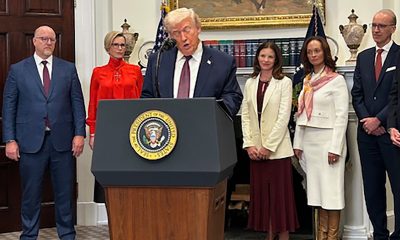Local
Accusations fly as Equality Md. copes with crisis
State group could close; board blames fired director for mismanagement
Equality Maryland will likely lay off its four remaining staff members and could be forced to close if sufficient funds aren’t raised to cover costs, according to its board president, who blames the organization’s former executive director for the crisis.
“We brought in an interim executive director to assess the state of our resources,” said Charles Butler, Equality Maryland’s board president. “She did a rapid assessment and confirmed our fear that Equality Maryland has been perhaps irreparably damaged by the previous executive director.”
Morgan Meneses-Sheets was fired as director last month. Butler claims she entered into expensive contracts on behalf of the organization and hired staff without the board’s approval or knowledge.
“The most serious of the harms that we’re facing now is the depleted financial conditions of the organization, which may require the termination of existing staff due to the financial commitments [Meneses-Sheets] made on the organization’s behalf,” Butler said.
He appealed to the LGBT community in Maryland to step up and save the organization with donations of money and volunteer time.
“Hopefully the LGBT community in Maryland will come together and support the organization financially because otherwise that will leave a void in the state,” he said.
Meneses-Sheets sharply disputed Butler’s accusations and in a candid interview took aim at Equality Maryland’s board and even the state’s eight-member LGBT Caucus.
“I wish he’d be a grown up and allow me to move on,” she said, describing her termination as “a groundless rash decision.”
She denied entering into contracts without the board’s knowledge and claimed she wasn’t authorized to sign anything in the last six months of her tenure without approval. Further, she said she could not pay any bill in excess of $1,000 without approval from the board treasurer.
“We produced monthly reports and there weren’t contracts or liabilities they weren’t aware of, it’s complete nonsense,” Meneses-Sheets said. “Maybe Chuck wasn’t paying attention to the reports but they were generated.”
But a second knowledgeable source, who spoke on condition of anonymity, said Meneses-Sheets agreed to a payment plan with a vendor that included a June 2011 balloon payment in excess of $10,000. The source said Meneses-Sheets did not inform the board of the obligation. In addition, the source claims that Meneses-Sheets brought on four staffers as contractors without the knowledge or consent of the board.
In addition to the accusations of financial mismanagement, Butler said there were other problems with Meneses-Sheets’ performance. He claims she made a controversial decision to remove a public accommodations provision from the state’s gender identity non-discrimination bill without informing the board. That decision riled some transgender activists, who pulled their support for the bill, which ultimately died. Again, Meneses-Sheets denies that she acted unilaterally and said the decision to pull the provision came from the bill’s sponsor, Del. Joseline Pena-Melnyk (D-Prince George’s and Anne Arundel Counties).
“It’s unfortunate that the board chair is pointing fingers,” Meneses-Sheets said. “Board members were consulted … the decision was made by the sponsor and our choice was to support the bill. It’s ridiculous to suggest that I was running around willy-nilly.”
Again, Equality Maryland insiders paint a different picture. The anonymous source said Meneses-Sheets approached national LGBT partner organizations and the bill’s sponsor and “made a deal without board approval or knowledge.” By the time the board found out the public accommodations provision had been stripped, the bill was already being written in Annapolis and it was too late to change it, the source claims.
Butler also claimed that Meneses-Sheets left Equality Maryland’s member and donor database in disarray. He said the database was damaged while merging information from another database but that Meneses-Sheets didn’t inform the board.
“That database is arguably our most valuable material asset,” Butler said, adding that most donor information obtained at the organization’s fall gala that raised $25,000 was lost. He urged Equality Maryland donors to proactively contact the group as some e-mail addresses and phone numbers can’t be found.
Once again, Meneses-Sheets tells a very different story. She claims the database was “a wreck” when she arrived at Equality Maryland and that the new problem surfaced in the fall but that she brought on a volunteer to clean it up and rebuild it.
“Wrong,” the anonymous source said, “she knew the database was damaged and did nothing about it.”
Meneses-Sheets made allegations of her own — that she never had performance reviews, was treated unprofessionally, left the organization with money in the bank and that the board deceived her about the stability of the organization when she was hired. “They were in the red and barely getting by,” she said. Despite the accusations, she said she didn’t contemplate a lawsuit after her departure and never filed for unemployment benefits. She found a new job and now works for Pride at Work.
She claims that the eight-member LGBT Caucus was a “major force in choosing me as the scapegoat.”
“Several sources told me they played a big role in deciding I would be the scapegoat,” she said. “Should the LGBT legislators decide who staffs the LGBT organization? They’ve created an untenable situation where they dictate everything.”
Sources dispute the claim that Equality Maryland was in the red at the time the group hired Meneses-Sheets and insist that she neglected her responsibility to raise funds.
“Her idea of development was to go to happy hours all over the state of Maryland and ask for $5 donations,” the source said. “Her fundraising plan was never more sophisticated than that.”
The flap over Meneses-Sheets’ termination has offered a glimpse into how state LGBT rights groups interact with national groups like the Human Rights Campaign, Freedom to Marry and the Gill Action Fund.
“The shit has hit the fan,” Meneses-Sheets said, “[the board] realizes there are major problems with the LGBT Caucus and that the national groups have their own agendas that have nothing to do with supporting Equality Maryland. They’ve gotten no money and they’re panicking.”
She claims that at the time she left the organization, there were rumors that HRC would keep Equality Maryland out of future efforts to pass a marriage equality bill, following this year’s failed attempt.
Butler confirmed that the national groups are involved in Maryland’s marriage fight. HRC’s regional field director, Sultan Shakir, began working at Equality Maryland’s headquarters office in Baltimore earlier this month.
“HRC is working with local and national groups to help build a strong campaign to pass Equality Maryland’s entire legislative agenda next year,” said HRC spokesperson Fred Sainz. “While HRC currently has a field staffer working in the Baltimore headquarters to support their new executive director, there are no set plans to keep him there,” he said.
Butler said the national groups are working on a campaign field strategy and a plan to combat an anticipated referendum to overturn a same-sex marriage law and that he’s unsure if that effort would be run out of Equality Maryland or be physically located elsewhere. Sainz denied rumors last week that HRC sought to install Shakir as the new Equality Maryland director.
But the marriage struggle in Maryland could be hampered if Equality Maryland is forced to close.
“We need your support, financially and otherwise, we need your involvement,” Butler said. “I’m fairly optimistic we can raise enough funds so that we can keep the organization running. I think we do have a realistic shot at getting the marriage bill and the gender identity bill passed in the next legislative session.”
Assuming the organization can raise funds to cover its expenses, Butler said the next step would be to hire an executive search firm to “find us a competent, strong director.” He said it’s important to work more closely with the community and, to that end, the organization now seeks to expand its board.
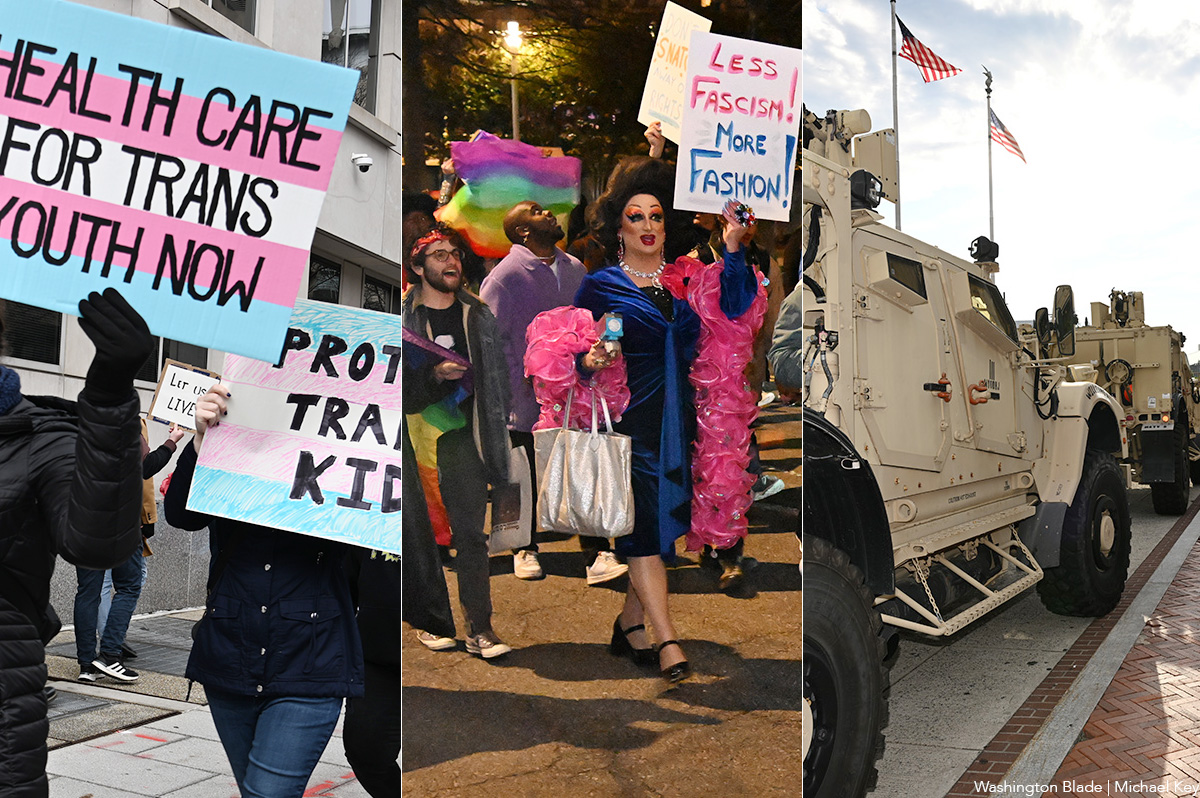
The year 2025 brought unprecedented challenges to D.C. as President Trump initiated a takeover of local police operations and implemented ICE raids in the city. Below are our picks for the top 10 LGBTQ news stories of the year.
10. Man gets 15 years for drug sale that led to deaths of two gay men
A D.C. man was sentenced by a federal judge on June 26, 2025, to 15 years in prison after he pleaded guilty three months earlier to conspiracy related charges that he distributed large amounts of fentanyl and cocaine in the D.C. area, including the sale of fentanyl that resulted in the December 2023 deaths of two D.C. gay men.
A statement released by the Office of the U.S. Attorney for D.C. said Jevaughn Mark, 33, was charged, among other things, with selling fentanyl rather than the requested ketamine, known as “Special K,” to one of the two gay victims who shared the drug with his gay friend. Police identified the men as Brandon Roman, 38, a prominent D.C. attorney and LGBTQ rights advocate, and Robbie Barletta, 28, a home renovation business owner and historic preservationist.
An official with the D.C.-based group HIPS, which provides services to drug users, called the deaths of the two men a poisoning rather than an overdose because they unknowingly consumed the highly toxic fentanyl rather than the ketamine they thought they had.
9. Drag queens, protesters denounce Trump’s Kennedy Center takeover
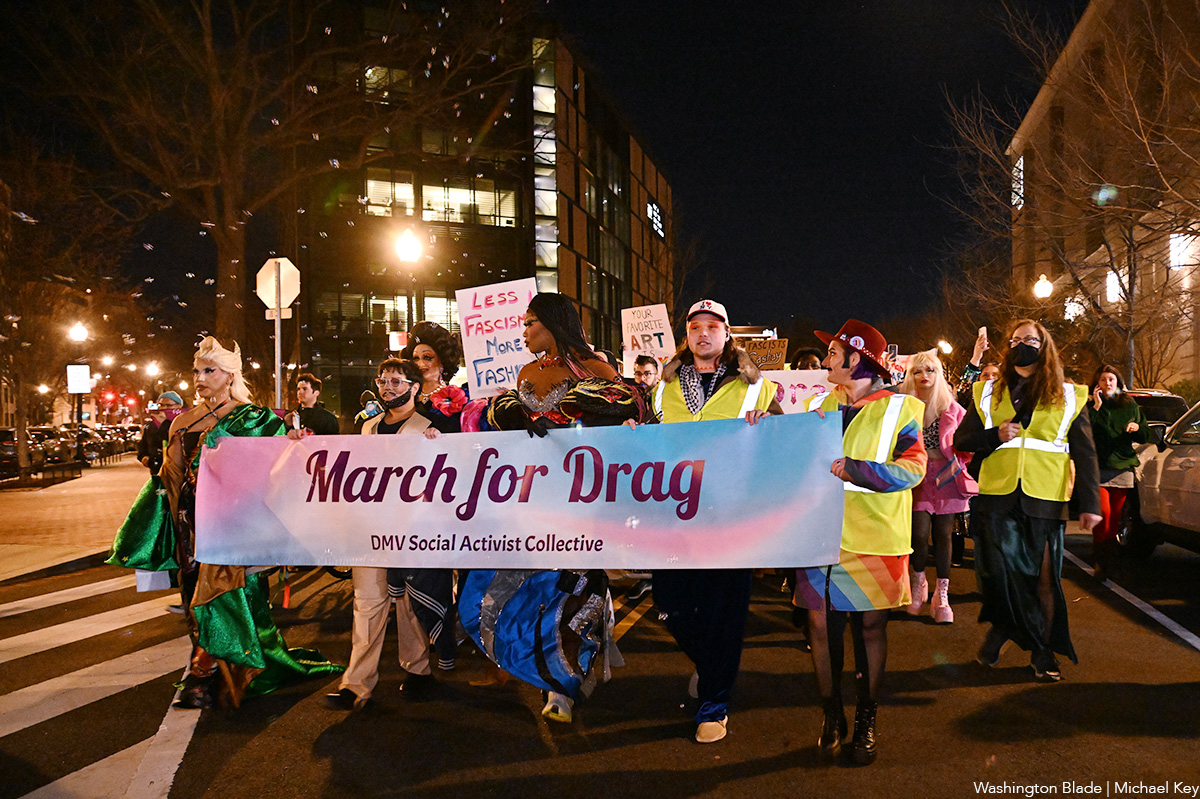
D.C. drag performer Tara Hoot was among other drag queens and about 100 supporters who marched in February from Washington Circle to the Kennedy Center to protest President Donald Trump’s Kennedy Center “takeover” by his appointment of Trump supporters to the performing arts facility’s board of directors.
Hoot and three other local drag performers followed up with their own Kennedy Center protest in June by attending the Kennedy Center’s opening night performance of “Les Misérables” while Trump himself was in attendance. Among the concerns raised by the protesters was the Kennedy Center’s decision in February to cancel a performance by the Gay Men’s Chorus of Washington scheduled for May to celebrate the upcoming WorldPride 2025 DC events. A Kennedy Center spokesperson said the performance was canceled because of “financial” and “scheduling” factors and not by the Trump initiated management changes.
8. D.C. LGBTQ Center celebrates opening of new, larger offices

The D.C. LGBTQ+ Community Center officially opened its new expanded offices on April 26 at 1828 Wiltberger St., N.W., located one block from the Shaw Metro station.
Spanning 6,671 square feet of intentionally designed space, Center Director Kimberley Bush said the new space would offer a wide range of resources for LGBTQ individuals in need – including mental health services, job readiness programs, cultural events and community support groups, all under one roof.
7. Deaths of five key local LGBTQ advocates in 2025
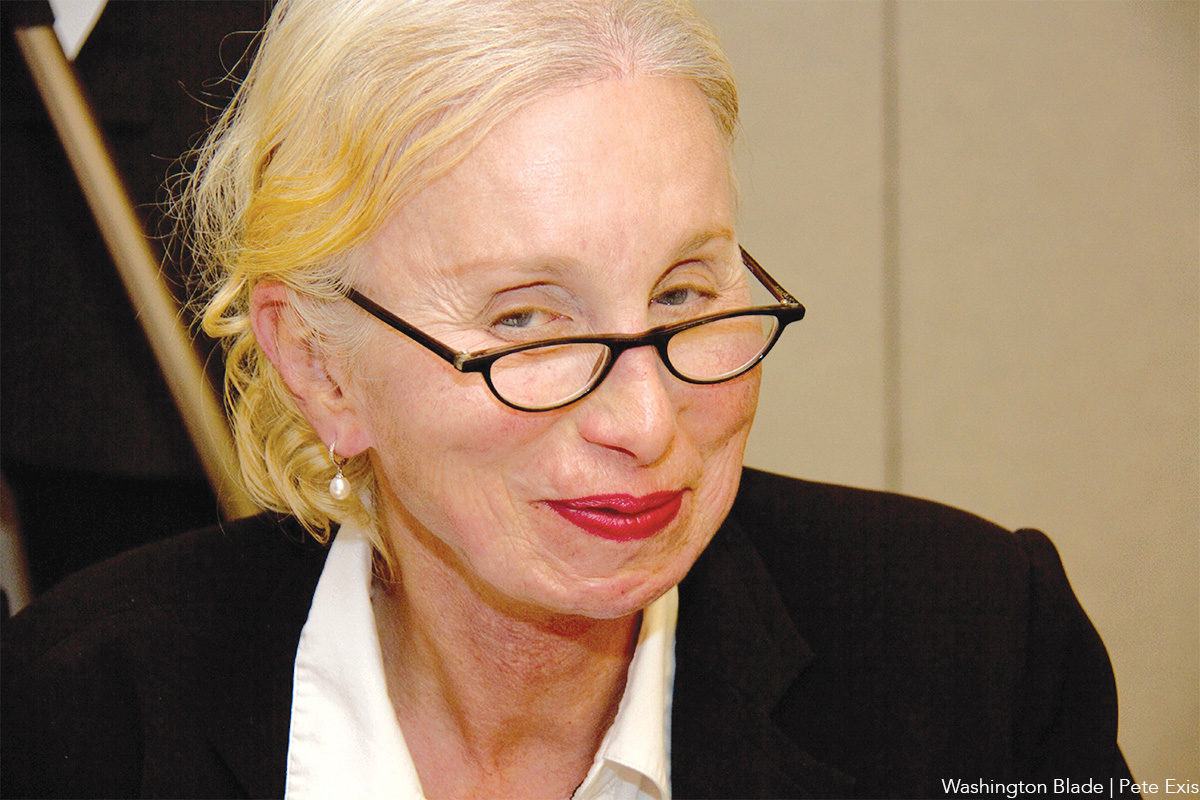
The LGBTQ community took note of the passing of at least five highly regarded local LGBTQ advocates in 2025. Among them were Jeri Hughes, 73, a longtime local transgender rights activist; Dale Sanders, 75, a highly acclaimed D.C. attorney for more than 40 years who played a leading role in providing legal services to people with HIV/AIDS; Patrick Shaw, 60, a highly regarded D.C. public schools teacher; Thomas Mangrum, 61, an acclaimed advocate for people with disabilities and LGBTQ rights activist involved in the city’s Capital Pride events; and Loraine Hutchins, a nationally known and acclaimed advocate for bisexual and LGBTQ rights, and co-author and editor of a groundbreaking book on bisexuality.
6. Pro-LGBTQ Spanberger elected Va. governor
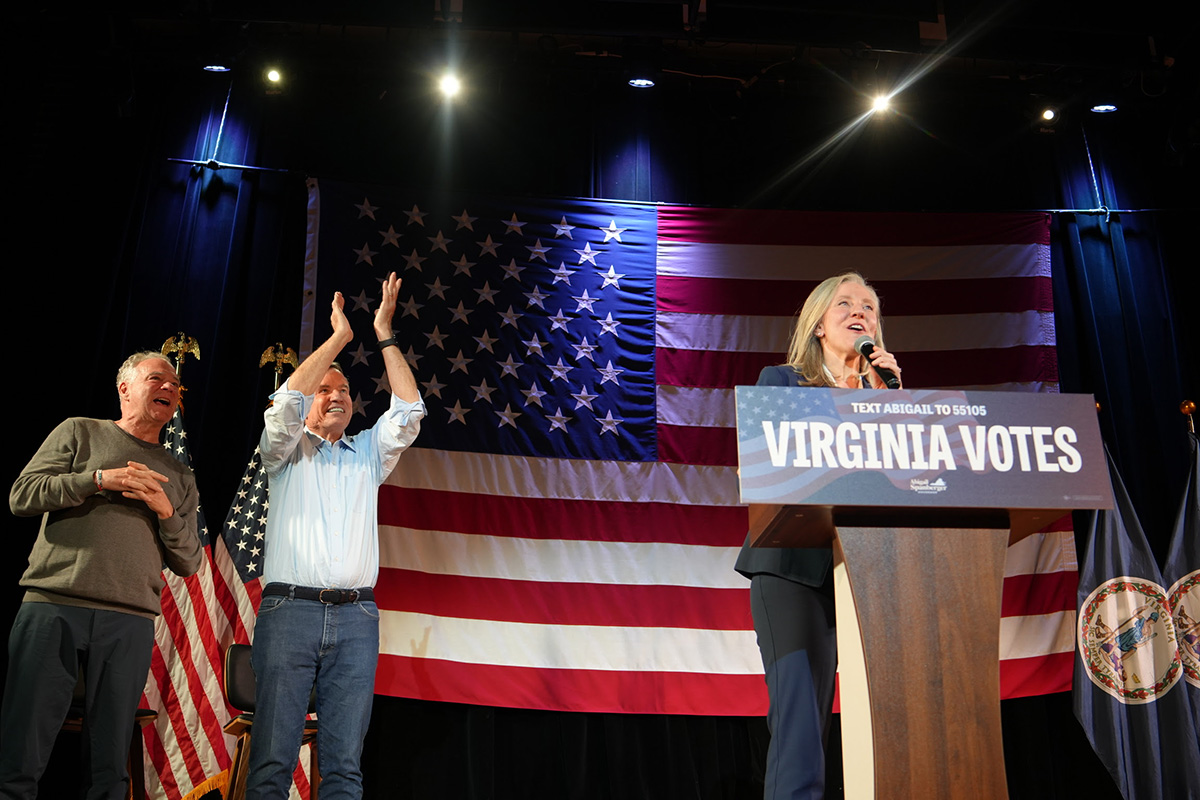
Former congresswoman and longtime LGBTQ rights supporter Abigail Spanberger (D) won her race for governor of Virginia on Nov. 6, defeating the state’s Republican lieutenant governor, Winsome Earle-Sears, who expressed strong opposition to LGBTQ equality. Spanberger, who will succeed incumbent GOP Gov. Glenn Youngkin in January, becomes Virginia’s first female governor.
Meanwhile, John Reid, a gay conservative radio talk show host in Richmond for many years, lost his race as the Republican candidate for lieutenant governor in Virginia, falling short of becoming the state’s first openly gay person to win a statewide office. Reid lost to Democrat Ghazala Hashmi, a member of the Virginia State Senate, who became the first Muslim woman to win election to a statewide office in any state.
5. Trans erasure hits D.C.
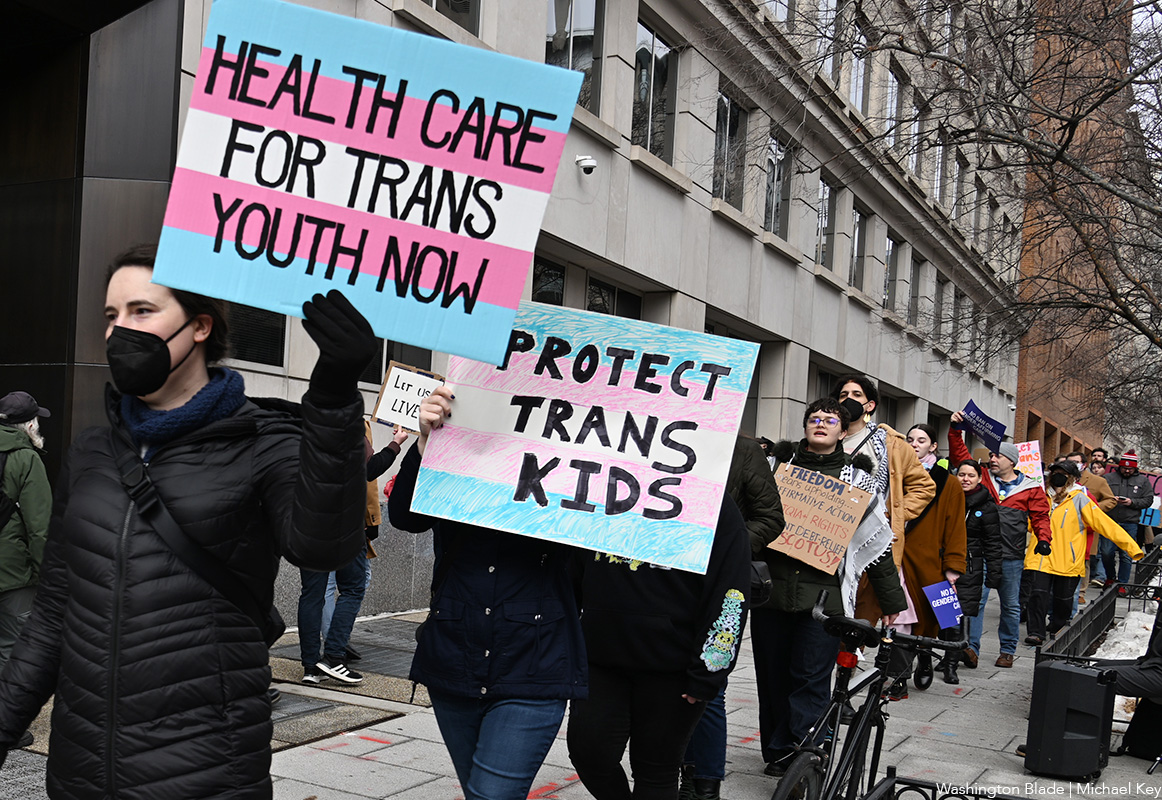
The National Park Service, which owns and maintains Dupont Circle as a federal park, in February removed all references to transgender people from its website devoted to Dupont Circle history. In a development believed to be linked to one of President Trump’s early executive orders banning federal support for trans related issues, the Park Service removed all mention of trans people from its website but left on the site multiple references to the “GLB community.”
In yet another act of what LGBTQ activists are calling “trans erasure,” D.C.’s Children’s National Hospital in July announced it would discontinue beginning Aug. 30 gender transition medical care it has provided for juvenile patients for at least the past 20 years. In a statement posted on its website, the highly acclaimed pediatric hospital said the change was made “in light of escalating legal and regulatory risks to Children’s National.” Most observers interpreted that to mean the risk of federal funding cuts linked to the Trump administration’s animus toward trans supportive programs or policies.
4. D.C. Mayor Bowser announces she will not run for re-election

D.C. Mayor Muriel Bowser, a longtime vocal supporter of the LGBTQ community, announced on Nov. 25 that she will not run for a fourth term. Since first taking office as mayor in January 2015, Bowser has been an outspoken supporter on a wide range of LGBTQ-related issues, including marriage equality and services for LGBTQ youth and seniors.
LGBTQ activists have pointed out that Bowser’s record of support on LGBTQ issues dates back to her tenure as the Ward 4 D.C. Council member from 2007 through January 2015, when she took office as mayor. They also credit her with expanding and significantly increasing funding for the Mayor’s Office of LGBTQ Affairs and appointing the largest number of openly LGBTQ officials to D.C. government jobs than any prior D.C. mayor.
“It has been the honor of my life to be your mayor,” Bowser said in a statement.
3. D.C. LGBTQ bars ‘hanging in there’ amid tough economy

The owners of several of D.C.’s at least 25 LGBTQ bars told the Blade in November they had been negatively impacted by a series of developments and issues impacting most other D.C. bars, restaurants, and nightlife venues. Among the lead issues impacting them, they said, were the deployment by President Trump of National Guard troops on city streets, the nearly two-month-long federal government shutdown that ended in late November, and skyrocketing prices of food and other supplies brought about by the Trump administration’s tariff program.
Other factors cited were a decline in tourist visits to D.C. due to alienation from the Trump administration and a large increase in the number of LGBTQ bars in recent years that some observers said has resulted in fewer people going to each of the LGBTQ bars, the latest one, Rush at 14th and U Street, N.W., having opened in December.
2. At least 1.2 million turn out for WorldPride D.C.

At least 1.2 million people turned out from throughout the U.S. and internationally for WorldPride D.C. 2025, which took place from mid-May through June. It included hundreds of events held across the city. Among them were an international human rights conference, a March on Washington for LGBTQ Equality, sporting events with LGBTQ athletes, concerts by LGBTQ choral groups and nationally acclaimed pop musicians.
The events culminated with a six-hour-long WorldPride Parade on June 7 that drew hundreds of thousands of participants and bystanders and included a 1,000-foot long rainbow flag that led the parade. The WorldPride street festival and concert took place that same day and the following day, on June 8, along Pennsylvania Ave, N.W. that included hundreds of booths.
The 1.2 million attendance and the a $310 million economic impact it had on the city were significantly less that what had been initially predicted by city officials, who, along with LGBTQ activists, said the lower attendance and economic impact was due in part to the anti-LGBTQ policies and alienation of many potential foreign visitors by the Trump administration.
1. Trump takes control of D.C. police, deploys National Guard

LGBTQ rights advocates joined community leaders across the city in condemning President Donald Trump’s decision in August to take control of the D.C Metropolitan Police Department and deploy 800 National Guard troops to address what he called a crime wave caused by “bloodthirsty criminals” and “roving mobs of wild youth.”
A coalition of local LGBTQ advocacy organizations joined other community leaders, including gay D.C. Council member Zachary Parker (D-Ward 5), in calling Trump’s action a “power grab” aimed at eliminating D.C.’s locally elected government that would adversely impact people of color, the LGBTQ and immigrant communities.
In a development that captured national attention, a gay man was arrested on Aug. 10 on a misdemeanor assault charge for tossing a hero sandwich into the chest of a uniformed U.S. Customs and Border Control agent on a street near several gay bars in what he called an act of protest and defiance of the Trump deployment of federal troops and agents in D.C. In what some observers called a gesture of support for gay sandwich thrower Sean Charles Dunn, a federal court jury handed down a verdict of not guilty for the assault charge.
District of Columbia
Reasons to be optimistic about 2026
Local thought leaders offer hope for the New Year
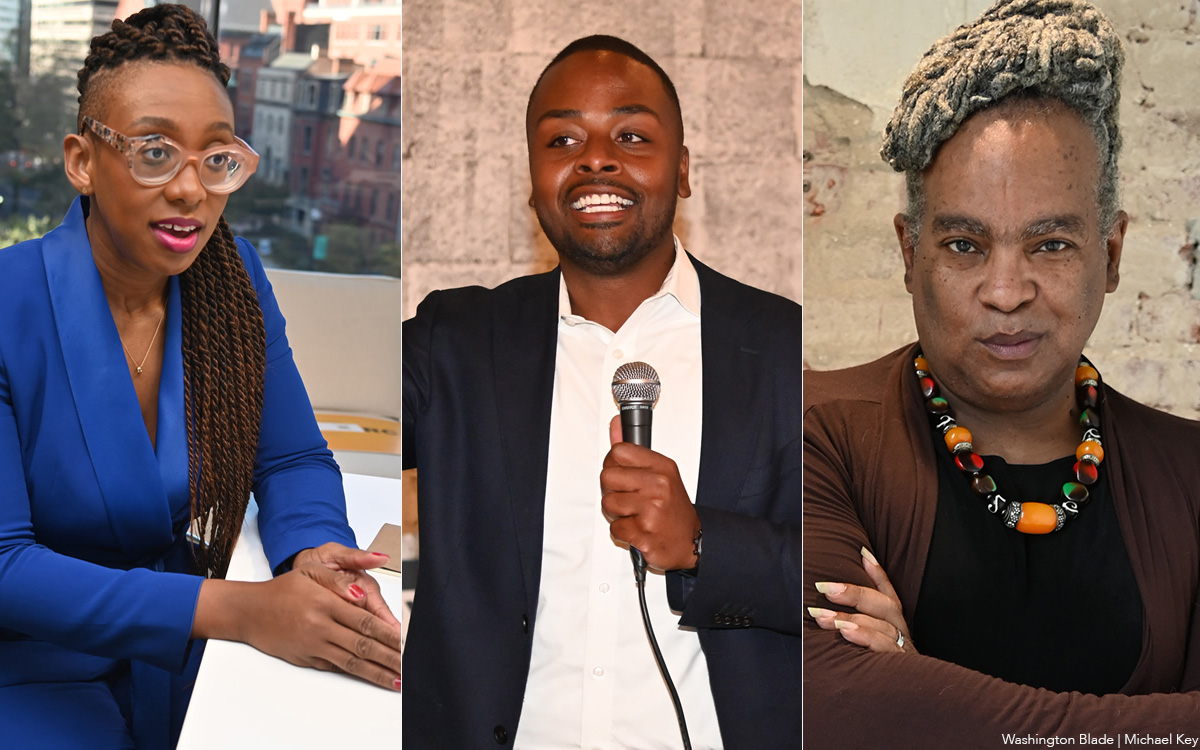
It was a year like no other. It began with Donald Trump’s inauguration in January 2025 and included a takeover of D.C. police, ICE raids, challenges for the local economy, and other events that have many queer Washingtonians ready for 2026.
As we prepare to welcome the New Year, the Blade asked a range of local thought leaders about what makes them optimistic for 2026. Here are their responses.
June Crenshaw
Deputy Director, Capital Pride Alliance
What gives me optimism for 2026 is the way our LGBTQIA2S+ community supports one another – across identities, neighborhoods, and movements – and because we continue to build our collective powers; we demand and create safer, more inclusive spaces.
Zachary Parker
Ward 5 DC. Council member
I’m optimistic about the upcoming elections and the District’s continued fight for local autonomy. One thing I know for sure is that Washingtonians are tough and persistent, and we’re ready to face any challenge as we keep fighting for D.C. statehood.
Sister Jeannine Gramick
Co-founder of LGBTQ supportive New Ways Ministry
As a nun who thinks politically about the Catholic Church, I’m extremely optimistic that Pope Leo XIV will continue to welcome LGBTQ people. At the conclave, most cardinals knew Pope Francis had (then) Cardinal Proost in mind!
Adam Ebbin
Virginia State Senator representing parts of Arlington, Alexandria, and Fairfax Counties
I am excited about 2026 bringing the return of the pro-equality governor to Virginia. I believe that Abigail Spanberger will be a champion for LGBT people and it will also be the year that we can finally pass the necessary legislation to send a constitutional amendment to the voters that would guarantee marriage equality in the Virginia Constitution.
Howard Garrett
President, Capital Stonewall Democrats
In 2026, our community can be optimistic because we’ve proven, again and again, that when we organize, we win: at the ballot box, in the courts, and in our neighborhoods. Even amid challenge, LGBTQ+ Washingtonians and our allies are building stronger coalitions, electing champions, and advancing real protections that make daily life safer and more affirming for everyone.
Paul Kuntzler
D.C. LGBTQ activist since the early 1960s, co-founder of Capital Stonewall Democrats
Last Nov. 4, 11 states held elections and Democrats won almost all of the elections. Next Nov. 3, 2026, Democrats will win control of both the House and Senate …An Economist poll reported that 15 percent to 20 percent of those who voted for Trump no longer support him. The results of the elections of Nov. 3, 2026, will be the beginning of the end of Trump and his racist and criminal regime.
Kelley Robinson
President, Human Rights Campaign
This past year has brought relentless attacks against the LGBTQ+ community, but it has also shown the resiliency of queer folks. While this administration has worked tirelessly to oppress us, we’ve met that oppression with courage. As we step into 2026, my hope is that we carry that energy forward and continue protecting one another, fighting back against injustice, and celebrating queer joy. If 2026 is anything like 2025, we know the challenges will be intense, but our community is more determined than ever to meet hate with resilience, and to turn struggle into strength.
Freddie Lutz
Owner, Freddie’s Beach Bar in Arlington and Rehoboth Beach
I am optimistic that the current president will fulfill his promise to boost the economy. We are all suffering – businesses in D.C. I just read it is 17 to 18 percent down. And I’m hoping the president will boost the economy. I always try to remain optimistic.
Nicholas F. Benton
Owner & Editor, Falls Church News-Press
My optimism stems from my belief in the human capacity and generosity of spirit. Those who are committed to those qualities will find a way.
Richard Rosendall
Former president, D.C. Gay & Lesbian Activists Alliance
MAGA efforts to demonize LGBTQ people are dangerous but will fail overall because understanding and acceptance have grown and endured. The blue wave in November 2026 will show this.
TJ Flavell
Organizer, Go Gay DC
Hope springs eternal. Nurturing your own wellness is vital to the New Year, including enjoying social and cultural activities through such groups as Go Gay DC – Metro DC’s LGBTQ Community. Also, 2026 ushers in a new tax deduction for charitable giving. Check the IRS website for details. You can make a positive impact in the New Year by supporting good charitable causes like the D.C. LGBTQ+ Community Center, a safe, inclusive, and affirming space where all members of our community can thrive.
Rayceen Pendarvis
Leader of Team Rayceen D.C. LGBTQ support organization
I have experienced many trials and tribulations in my lifetime, throughout which my spirit has enabled me to find peace despite the turbulence around me. Being optimistic allows me to be a beacon of light for those who may be lost in the darkness.
Zar
Team Rayceen organizer
My reason for optimism is this: death. Life is a cycle of time, change, and destruction. Everything is impermanent; the time any person rules is finite and eventually all empires end.
DJ Honey
Team Rayceen supporter
Despite the noise, I see 2026 as a year where queer people continue choosing community over isolation. Even when challenged, our culture keeps evolving. We are more visible, more creative and intentional about building spaces that protect each other and center joy without asking permission.
Nick Tsusaki
Owner, Spark Social House, D.C. LGBTQ café and bar
I’m optimistic for 2026 because it feels like the tide is turning and we’re coming together as a community.
District of Columbia
Rush reopens after renewing suspended liquor license
Principal owner says he’s working to resolve payroll issue for unpaid staff

The D.C. LGBTQ bar and nightclub Rush reopened and was serving drinks to customers on Saturday night, Dec. 20, under a renewed liquor license three days after the city’s Alcoholic Beverage and Cannabis Board suspended the license on grounds that Rush failed to pay a required annual licensing fee.
In its Dec. 17 order suspending the Rush liquor license the ABC Board stated the “payment check was returned unpaid and alternative payment was not submitted.”
Jackson Mosley, Rush’s principal owner, says in a statement posted on the Rush website that the check did not “bounce,” as rumors circulating in the community have claimed. He said a decision was made to put a “hold” on the check so that Rush could change its initial decision to submit a payment for the license for three years and instead to pay a lower price for a one-year payment.
“Various fees and fines were added to the amount, making it necessary to replace the stop-payment check in person – a deadline that was Wednesday despite my attempts to delay it due to these circumstances,” Mosley states in his message.
He told the Washington Blade in an interview inside Rush on Saturday night, Dec. 20, that the Alcoholic Beverage and Cannabis Administration (ABCA) quickly processed Rush’s liquor license renewal following his visit to submit a new check.
He also reiterated in the interview some of the details he explained in his Rush website statement regarding a payroll problem that resulted in his employees not being paid for their first month’s work at Rush, which was scheduled to take place Dec. 15 through a direct deposit into the employees’ bank accounts.
Several employees set up a GoFundMe appeal in which they stated they “showed up, worked hard, and were left unpaid after contributing their time, labor, and professional skills to Rush, D.C.’s newest LGBTQ bar.”
In his website statement Mosley says employees were not paid because of a “tax related mismatch between federal and District records,” which, among other things, involves the IRS. He said the IRS was using his former company legal name Green Zebra LLC while D.C. officials are using his current company legal name Rainbow Zebra LLC.
“This discrepancy triggered a compliance hold within our payroll system,” he says in his statement. “The moment I became aware of the issue, I immediately engaged our payroll provider and began working to resolve it,” he wrote.
He added that while he is the founder and CEO of Rush’s parent and management company called Momentux, company investors play a role in making various decisions, and that the investors rather than he control a “syndicated treasury account” that funds and operates the payroll system.
He told the Blade that he and others involved with the company were working hard to resolve the payroll problem as soon as possible.
“Every employee – past or present – will receive the pay they are owed in accordance with D.C. and federal law,” he says in his statement. “That remains my priority.”
In a follow-up text message to the Blade on Sunday night, Dec. 21, Mosley said, “All performers, DJs, etc. have been fully paid.”
He said Rush had 21 employees but “2 were let go for gross misconduct, 2 were let go for misconduct, 1 for moral turpitude, 2 for performance concerns.” He added that all of the remaining 14 employees have returned to work at the time of the reopening on Dec. 20.
Rush held its grand opening on Dec. 5 on the second and third floors of a building at 2001 14th Street, N.W., with its entrance around the corner on U Street next to the existing LGBTQ dance club Bunker.
With at least a half dozen or more LGBTQ bars located within walking distance of Rush in the U Street entertainment corridor, Mosley told the Blade he believes some of the competing LGBTQ bars, which he says believe Rush will take away their customers, may be responsible along with former employees of “rumors” disparaging him and Rush.



